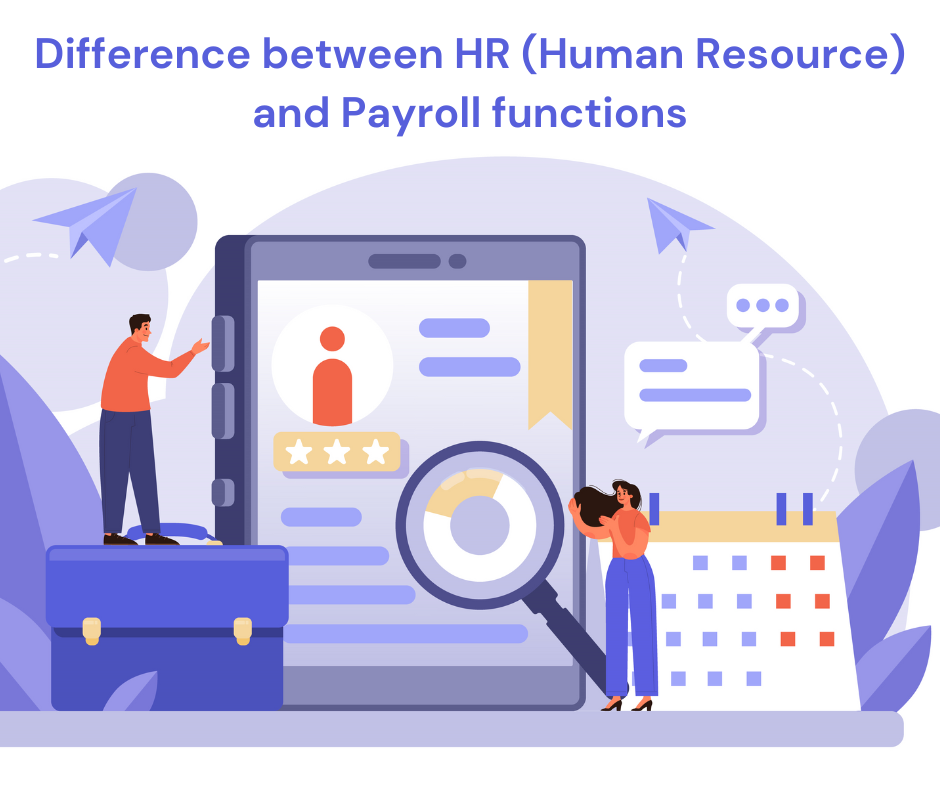HR and payroll service divisions within a corporation typically handle distinct tasks. HR often oversees employee relations, while payroll is responsible for managing employee salaries. To learn about the specific distinctions between payroll and HR responsibilities, take a read through the rest of this blog.
There’s a fine line between HR and payroll, which make employee pay decisions, and the team that processes employee pay. Sometimes, it’s indistinguishable.
The difference between HR and payroll comes down to expertise—in people or money. But it’s a small difference when payroll is the function that connects the money to the people.
Are they the same or different?
In some organizational models, HR and payroll are lumped under the same category. In others, they’re separate departments. And in others, payroll is a part of finance. There is no right or wrong way to organize your business, but payroll and HR are technically separate functions.
Human resources professionals are all about people. It’s their job to bridge the gap between human needs and organizational needs. They do it by placing the right talent in the right positions, developing that talent, and compensating talent appropriately, and they measure every effort to see what works and what doesn’t.
By contrast, payroll is all about the money—crunching the numbers and staying compliant. They’re payroll professionals because spreadsheets and calculators are their happy places. These analytically inclined employees love detail and accuracy.
But while HR and payroll are two distinctly separate functions, they are still close friends. And their relationship can play out in different ways.
What is the payroll function?
Payroll, in simple terms, is the process of paying employees their salaries or wages. It involves tasks such as calculating bonuses, handling deductions, and ensuring timely payment to employees. The payroll department is also responsible for recordkeeping, verifying payment information, and providing employees with pay slips.
What is the HR function?
On the other hand, Human Resources (HR) is the department that manages all aspects of personnel within a company. This includes hiring new employees, managing employee departures, and ensuring compliance with labor laws. HR oversees employee behavior, both at the workplace and occasionally off-site, and may address issues related to social media and external influences.
HR plays a crucial role in training employees for their positions to avoid additional costs associated with an unprepared workforce. Additionally, HR upholds corporate policies, contributes to their development as the company expands, and creates motivational programs and cultural adjustments to enhance the working environment.
Overall, HR covers many responsibilities, including hiring, policy development, performance management, and compliance with employment laws. Transactional tasks such as report creation, handling payroll issues, and maintaining employee records are also part of HR duties.
Read more: (Key Benefits of Outsourcing HR Services)
Payroll as a human resource function:
Payroll is deeply intertwined with employee benefits administration and compensation programs. In fact, most human resource changes, like pay raises and overtime approvals, directly affect payroll.
On the other hand, HR depends on nitty-gritty payroll details to keep the company out of hot water.
- It’s hard to deny the close relationship between these two roles.
- HR enters new-hire employee information, and payroll verifies it.
- HR enters benefit deductions, and payroll verifies it.
- HR enters salary and rate changes, and payroll verifies them.
- HR approves bonus payouts and incentive pay, and payroll processes them.
- HR verifies current employee data, and payroll uses that data for deposits and tax reporting.
- HR implements a timekeeping policy, and payroll reviews timesheets, notifying HR of adherence problems.
Combining HR and payroll under a single department facilitates collaboration between the two. Employees in payroll functions can easily access and understand the policies that impact pay, while HR employees sit figuratively closer to the folks who oversee compliance.
But putting both functions in a single department also adds risk. With non-accountants accessing your payroll systems, you open the door for mistakes that can damage your credibility and cost you good talent.
Read more: (How to Streamline Payroll Management in HR? Importance of Payroll Management in HR)
HR (Human Resources) and payroll functions are distinct yet interconnected aspects of managing an organization’s workforce.
HR (Human Resource):
Focus on People: HR is primarily concerned with managing and developing the organization’s human capital. This includes recruitment, training, performance management, and employee relations.
Strategic Planning: HR plays a strategic role in aligning the workforce with the organization’s goals. It involves workforce planning, talent management, and creating a positive work culture.
Regulatory Compliance: HR ensures that the organization complies with labor laws and regulations. This includes handling employee grievances, maintaining a safe workplace, and addressing legal issues related to employment.
Employee Development: HR is responsible for employee growth and development. This involves training programs, career development initiatives, and creating opportunities for skill enhancement.
Payroll:
Salary and Benefits: Payroll focuses on the financial aspects of employment, ensuring that employees are paid accurately and on time. This includes salary, bonuses, and benefit administration.
Tax Compliance: Payroll is responsible for withholding and remitting the correct amount of taxes from employees’ salaries, ensuring compliance with tax regulations.
Record Keeping: Payroll maintains records of employees’ working hours, leaves, and other relevant financial information. Accurate record-keeping is essential for tax purposes and auditing.
Payment Processing: Payroll process which includes payments to employees, taking into account factors such as overtime, deductions, and other financial adjustments.
While HR and payroll have distinct functions, collaboration between the two is crucial. HR provides payroll with accurate employee information, such as changes in employment status, while payroll ensures that employees are compensated correctly based on this information. Together, they contribute to the smooth functioning of an organization’s workforce management.
Wrap-up:
While both HR and payroll functions play integral roles in managing an organization’s workforce, their key distinctions lie in their responsibilities and skill requirements. The synergy between these two functions is vital for safeguarding confidential employee information and ensuring the smooth financial and human resource operations of the organization.









